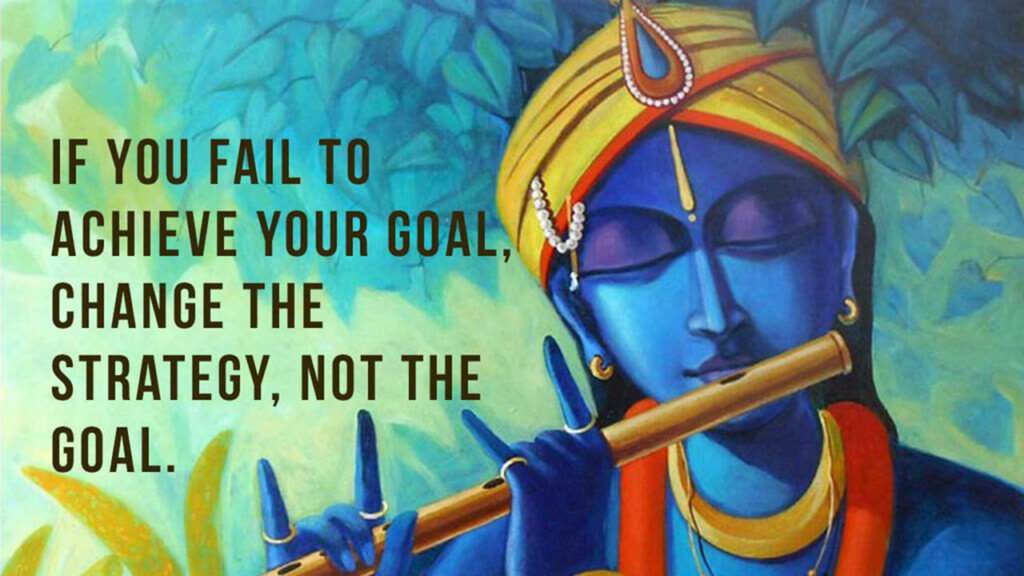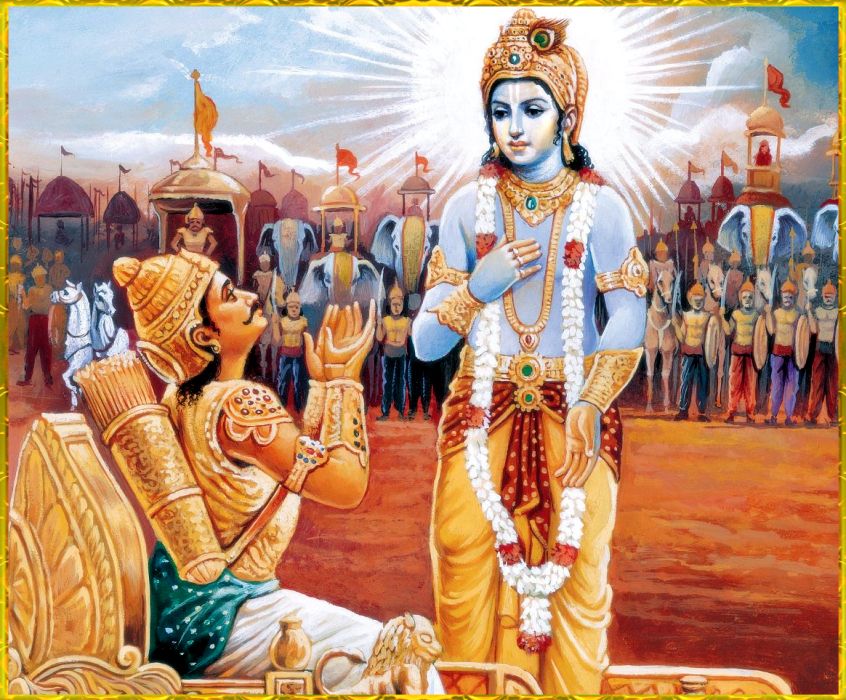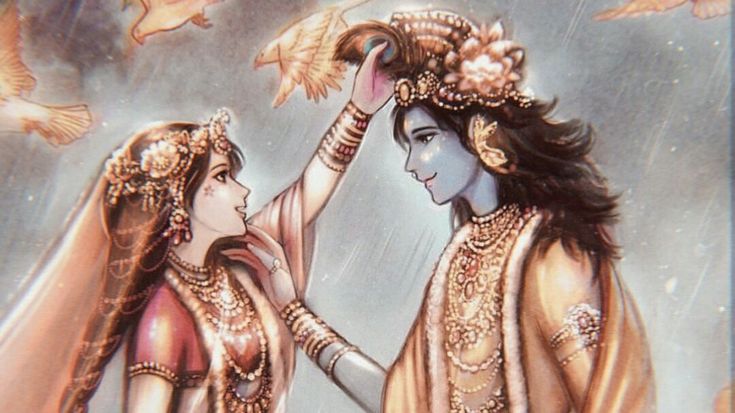Karma philosophy in ancient India forms a cornerstone in understanding the spirituality and ethics of many cultures across history. Krishna about Karma has shared various secrets. Such profound thinking is inextricably connected with the tradition of the Indian god Lord Krishna and forms an essential part of the religious text, Bhagavad Gita.
Krishna gives several lessons about the importance of Karma through his direct experiences and speech, especially elaborating on the role Karma plays in shaping cosmic harmony, the fate of the self, and the means to end the misery.
Krishna about Karma: Life Changing Lesssons
The concept of Karma is that:
Karma is the law of cause and effect, from the Sanskrit word “kri,” meaning “to do” or “to act.” The rule states that for every action one performs, there will be a reaction that can either shape his future or not. Whatever is done in this life determines what will happen later on, in this life and in other lives as well.
Krishna explains that Karma is not a concept that can be understood from doing good deeds; instead, it is the very texture of life. According to the Bhagavad Gita, every human person is always practicing actions inspired by the compulsions of three Gunas, namely Sattva, Rajas, and Tamas. That has to be thought about if one actually wants to comprehend how this works.
He teaches about duty and acts for selfless purposes:
The Bhagavad Gita contains all of the important wisdom on how to live in this world. One of the most important teachings has to do with the concept of “Dharma,” or righteous duty. He explains that every person has a unique role in society and that doing one’s duty without attachment to the outcomes is paramount. This principle is summed up in the famous verse:
“O Arjuna, perform your duty equipoised, O Arjuna, abandoning all attachment to success or failure. Such equanimity is called yoga.” Bhagavad Gita 2.48
He makes Arjuna perform the role of a Kshatriya according to Dharma and lets others focus on their activities as his duty or prescriptive duties because this not only maintains society’s integration but also helps it evolve towards a spiritual platform.
Importance of Selflessness through Action
Krishna about Karma: An important tenet in Krishna’s teaching was “Nishkama Karma”, that is, selfless action. He taught that one should act without attachment to the fruit of the action. This may be difficult in an action-driven world where success or acknowledgment is the key driver. Krishna assures that with pure actions, one frees from the cycle of samsara, and then a person’s heart attains purity.
He says:
“Actions performed without any desire for the fruits of those actions are neither binding nor karmically detrimental. They lead to liberation.” (Bhagavad Gita 3.19)
Through Nishkama Karma practice, we develop detachment, which helps us have peace and stability no matter what kind of outer circumstances we live in. Detachment here does not mean passivity because it actively engages in living life, but it continues to hold on to the knowledge that we are not really the final doer, after all.
The Karma Cycle includes birth, death, and then rebirth.
Krishna explains the cyclical nature of life through the principle of Karma. Everything one does has a rippling effect; it influences not just the present life but the subsequent one, in fact, all subsequent lives. According to Krishna, the soul is eternal and comes back in different births and rebirths as per the accumulated Karma in previous lives.
In the Gita, he says, This Self (or soul) never gets born and doesn’t get destroyed. It cannot be diminished or enlarged. It is without age, immortal, and is killed in not any moment. Bhagavad Gita 2.20
Understanding this cycle is very important to grasp the value of one’s actions. When one realizes that their actions affect others and have repercussions, it creates a feeling of responsibility towards oneself and others.
Intention and Karma: Nature of the Relationship
This essential principle, as reflected by Krishna about Karma, carries an element of the essence or purpose that gives an action. He determines the ethical quality behind his acts. Actions conducted as being full of love, pity, and truth carry tremendous positivity with them and, therefore, positively balance out their Karma. However in cases of selfish intent, anger, or even malice, they bring along the effects of negative Karma.
Krishna stresses that people ought to try to purify their intentions, aligning their conduct with higher values. In that sense, this purifying action serves as the basis of proper spiritual development and is essentially the same as “Sattvic” actions, allowing the mind to be refreshed and peaceful.
The Impact of Karma on Society
Karma is an expression of the law in terms of individualistic life experiences and conditions further the dynamics of society. Krishna about karma implies that selfless action conducted for the sake of societal well-being creates the right atmosphere for collective well-being to prevail. But what one does for the sake of lust, anger, or ego becomes a source of chaos and disorder. So Krishna asks humanity to perform in a smart manner because a man belongs to a specific entity; thus, such an understanding, because of interdependence among individuals, creates a society based on love and justice.
Three Types of Karmas
Karma goes far beyond cause and effect. It is the most basic part of Indian philosophy—the interplay of action, intention, and consequences shaping life experiences. According to various scriptural texts and the Bhagavad Gita, Karma can be broadly categorized into three primary types: Sanchita Karma, Prarabdha Karma, and Kriyamana Karma.
Understanding these categories can give us profound insight into our actions and their implications in our lives.
1. Sanchita karma: The collection of karmas
Sanchita Karma refers to the collected sum of all the activities that someone has performed in innumerable previous lives. It is something of a reservoir of karmic energy that is believed to affect the person’s potential in the present and in the future. Krishna about Karma is not seen in this life, but it serves as the premise upon which the experiences, challenges, and opportunities that the person may meet are decided.
Sanchita Karma can be termed as the saving bank of karmas. Money is saved, and, in cases of necessity, it draws out of it too. There are impressions of previous experiences that are drawn upon the later stages of births. An accumulation which is from all acts good to go about and has been taken, and this forms their stockroom.
This comprehensive model can surprisingly interact with one’s present activities in a dynamic way. For example, an individual has kept many positive Sanchita Karma. Hence, in this life cycle, he or she may get very pleasant situations such as good society, sound health, and the opportunity to win. Conversely, a person who was burdened with some unfavorable deeds in the previous life may have to lead a tough life.
2. Prarabdha Karma: The Destiny of the Present Life
Krishna about Karma: Prarabdha Karma refers to that part of Sanchita Karma that has been activated and is manifesting within the individual’s present life. Thus, it refers to the Karma determining what kind of challenges or experiences one is destined to experience in this lifetime or during the present period. Practically, Prarabdha Karma can be taken to mean “karma in action.”
This concept can be equated to the crops that have been planted and are now ripening; they cannot be changed without affecting the prevailing situation. For example, even though one may have accumulated wholesome Karma by performing good deeds in previous lives, this does not mean that all moments of this life will be free from distress.
Similarly, a person with many negative past karmic residues may face challenges but can still act to make a positive difference in the future.
It is the Prarabdha Karma that we usually talk about whenever we mention fate or destiny. That indeed points out a paradox in many spiritual philosophies: we cannot change the circumstances dictated by our Prarabdha Karma, but we do have the power to respond to it. The responses we choose create Kriyamana Karma-the actions that create further karmic outcomes.
3. Kriyamana Karma
The Actions of the Present Kriyamana karma, also agami karma, is what is being done now that makes up one’s current and future karmic landscape. These acts done with intent immediately affect our current experience and influence both our lives here now and our future in the future. Kriyamana Karma stresses the present with a sense of what we are choosing. Sanchita and Prarabdha Karmas, as such, cannot be changed directly, but via Kriyamana Karma, one has an opportunity to decide his destiny through conscious actions. By making virtuous, sensible choices in the midst of difficulties created by our Prarabdha Karma, we actually open doors for goodness to ensue later.
It is to be remembered that every action done with a particular motive generates new karmic effects. Good Kriyamana Karmas, whether through acts of kindness, compassion, or understanding, contribute positively both to our personal growth and the common experience of society. Conversely, negative actions created with ill intent can perpetuate cycles of suffering not only for ourselves but also for others around us.
The Interplay of the Three Karmas
One of the deep themes one can derive from understanding these three types of karmas is their interconnectedness. Sanchita Karma determines the potential challenges and opportunities that we will face; Prarabdha Karma decides the very circumstances with which we are dealing, here and now. Our reactions and choices, guided by Kriyamana Karma, determine how the ongoing flow of our experiences proceeds in karmic expertise; it is a cycle that perhaps leads toward liberation or deeper entanglement.
This interrelationship points toward the very heart of personal responsibility: it is easy to feel victimized by unfortunate circumstances, but we are really empowered to bring better futures into being through present actions.
Every conscious effort to act with integrity, compassion, and mindfulness can have far-reaching consequences, forming chains of positive effects that resonate throughout our lives and the wider community. This makes the three Karmas—Sanchita, Prarabdha, and Kriyamana—so valuable to understand in terms of how complicated the dynamics of our existence are. Krishna about karma has said that it invites us to ponder our actions within the larger tapestry of cosmic playfulness.
It is when one can handle and face all of life’s situations that we will find ways to develop properly with the concept of Kriyamana Karma. Through our aligned actions according to higher principles, the individual finds his path to growth spiritually and eventually leads toward a better coexistence.
During this journey, it’s great to be aware of how actions and decisions from the past intertwine. This will also provide understanding as to how we’re shaping our destiny with heavy bags of light and compassion – definitely quite positive to many around us. This, to my mind, is karma philosophy, plus commitment towards the lifestyle of meaningful actions and meaningful causes for living.
Read: Quotes by Lord Krishna
Overcoming Negative Karma
Krishna about Karma teaches one about the nature of Karma besides also giving an insight into the extent one might be able to redeem oneself from negative impacts arising from past actions. In this way, with sincere repentance, righteous living, and dedicated spiritual practices, one can negate adverse Karma.
Krishna about Karma has said that Bhakti, as an active practice of devotion, was considered a purification practice for the Karmas of humankind. A love relationship between the individual and the divine can help one break through past actions and align more with cosmic spiritual frequencies that bring people to liberation.
Conclusion
Lord Krishna about Karma is the ever-green roadmap throughout time. The principles of duty, intention, and what actions are known will let anyone pursue their life with a deep purpose and spiritual satisfaction, making them selfless or conscious of the interconnected human being, which shines lights and gives way toward human freedom and collective harmony. Krishna taught us to show others how serious our lives, actions, and motives are and how inspiration calls all of us to true compassion and wisdom.
Whatever we do adds upon vibrational waves corresponding as much to ourselves yet to our world-at-large in which we live for the reason that we can believe in ourselves; indeed, we are creators and design some of our destinies of a choosing. It’s, therefore, more than just a philosophical move; it is the deepest challenge to live with an alertness of purpose and in love.





